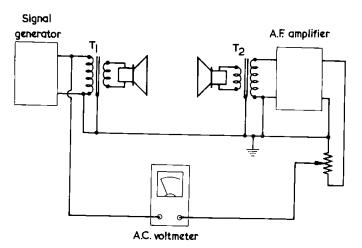In an earlier post, I gave some ideas for young mad scientists to employ for science fair projects. Another idea comes from the pages of the April 1966 issue of Radio Constructor, a British electronics magazine. The article explains two methods of experimentally measuring the speed of sound. One of those methods requires an oscilloscope, but the other one requires only an AC voltmeter.
Fortunately, the young experimenter of today can duplicate either of these experiments quite easily. For the version of the experiment requiring an AC voltmeter, most modern digital multitesters would be very suitable, and they are often available for next to nothing. The following examples are currently available at Amazon:
Harbor Freight often has multitesters on sale, or occasionally for free. They’re also available inexpensively at WalMart.
The oscilloscope is more expensive, but still a lot less expensive than 1966. For example, this USB Oscilloscope can be used with a PC for a reasonable price. And while a bit more do-it-yourself work would be required, this USB oscilloscope
is also very inexpensive.
The only other equipment required is an audio signal generator (for which you could easily use your computer’s sound card) and an audio amplifier, such as this one. The other required parts, such as speakers, can easily be scrounged up.
Using either method, it’s fairly simple to measure the wavelength of the audio signal. Since the frequency is known, it’s then an easy matter to calculate the speed of sound, which would be frequency times wavelength. The possibilities for using this as part of a science fair project are unlimited. For example, it would be possible to measure the speed of sound under various conditions, such as with differing barometric pressures or altitudes. By waterproofing the speakers, it would be possible to measure speed of sound in water, and compare it to the value in the air.
In any event, your poor teacher is probably tired of seeing paper mache volcanoes, and will probably be quite impressed at your abilities.
Click Here For Today’s Ripley’s Believe It Or Not Cartoon ![]()


